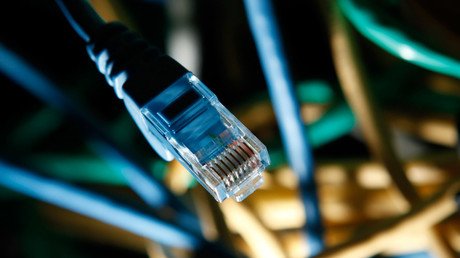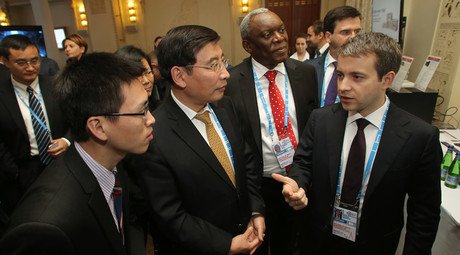Crimean IT infrastructure secure amid US internet monopoly – Russian comms minister to RT

Russia is actively working on diversifying its IT infrastructure and telecom technology in an effort to counter the dominance of the US in the Internet, Russia’s communications minister told RT, citing Crimea as an example of “complete victory.”
Crimea has become a vivid example of Russia successfully securing its IT infrastructure when almost immediately after the peninsula voted to become a part of the Russian Federation, citizens were provided with alternative communication lines.
“It was quite a critical task for Russian telecom companies to get the Crimea integrated in the general telecommunication infrastructure of the Russian Federation,” Russia’s communications minister Nikolay Nikiforov told RT.
“A telecom bridge was created to Crimea just in the few days when Crimea entered the infrastructure of Russian Federation… it helped us to be sure that no one could really influence the internet communication, cellphone infrastructure of Crimea.”
With three cell phone operators and access to 4G LTE Internet the people of Crimea can now enjoy telecom services which are “most competitive in the world,” the minister added.
Even recalling a time when Ukraine staged a power blockade of Crimea, temporarily leaving part of the peninsula without power, the minister called the way Russia’s telecom companies eventually resolved the problem a “complete victory.”
“It’s a complete victory, no more issues exist here now,” he said, though admitting a standing problem of territory-based sanctions imposed by the US which resulted in companies like Google and Apple discriminating against Russian citizens in Crimea.
“We do not support any kind of politically-motivated sanctions within the internet infrastructure,” Nikiforov said.
The solution to exclude a single country’s dominance in the IT sphere and internet infrastructure is to create a “more diversified IT ecosystem,” said the minister, adding that Russia has been actively engaging in promoting of the Internet and telecom services.
“Unfortunately, we see how the internet today is under the control of certain states… almost one country, since ICANN, which is the basic organization that monitors, controls and operates the core infrastructure of the Internet is under the legislation of the United States,” Nikiforov said.
“Here in Russia, the government is really sponsoring and co-investing in basic Internet infrastructure, especially for very small villages and settlements,” Nikiforov said, emphasizing that the government as a “key microeconomic investor” into the basic communication infrastructure by no means controlled or strived to control the Internet in Russia.
Some 2,000 small local villages have recently received access to fiberoptic communication lines, the minister noted, citing a new government project aimed at setting up communication lines in small settlements with a population of just several hundred people.
Despite the current state of affairs when IT and internet fields have almost been monopolized, Russia made considerable progress in diversifying its telecommunications, said Nikiforov. He went on to state that the “internet-related part of Russian economy continues its rapid growth” and is very important to the country’s economy.
The minister was speaking to RT at the World Economic Forum taking place in Crimea’s Yalta. More than a 1,000 participants from 25 states, including politicians, businessmen, activists and members of the European Parliament are taking part in the event which is set to last until April 16.














